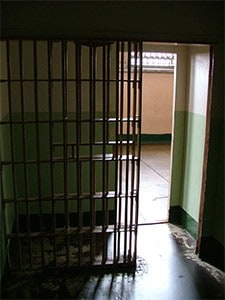A long-awaited vacation
By J. H.

It is difficult to know the unknowable, to contemplate the boundless, to utter the ineffable name, to conceive the inconceivable. To feel scared when you are a lowly criminal is impossible. Seven years ago, as I sat in administrative segregation, I was consumed by such thoughts and emotions.
Administrative segregation, known as “The Hole” in Hollywood vernacular, or “solitary confinement” in the old days, is that place you go when you are a special breed of human being … or more accurately, a breed of being considered less than human. You get there by way of prison; it’s the result of your commission of crimes and causing suffering for others.
I inflicted that suffering on others when I was 16—strung out and pissed off, a punk of a kid who cared about nothing and no one. Anger filled me, fueled by years of receiving abuse. It had bred in me an utter disdain for “people.” By the time I was 16 I’d had enough of the “injustice of suffering” or of “suffering injustice,” as my mind framed it. I’d simply had enough of life and I decided it was time for the world to know my disgust, my pain.
Six months, a few thousand dollars worth of amphetamines, and the worst day of my life later, I was well on my way to administrative segregation. “Ad-Seg,” a vacation spot in the lush rolling hills of southeast Missouri. There was a short layover in a county jail, a brief jury trial, and a life sentence to accomplish; but Ad-Seg was within sight.
At 18 I arrived in prison with a fresh life sentence and a stellar attitude, or not. Two days in I had a charming conversation with a man who wanted me to believe that my experience in prison would go more smoothly if I were his “bitch.” Events around that incident drove me so close to Ad-Seg that I could almost smell it. I managed, however, to wait two more years before I won my vacation there.
One day, when I was 20, another incarcerated person came to me and said, “You’re with me now.” I told him I wasn’t a “bitch.” He slapped me and told me I was. I returned to my cell and took stock of my life. If I had been tired of the abuse leading to my 16th year of life, I was now beyond fed-up. Anything, even a long stay in Ad-Seg, seemed a good alternative to the shit that now seemed to be my life. I ranted at a friend and then borrowed a shank (that’s prison jargon for a homemade knife). I’d solve this!
Thanks to the daily routine and structure of our lives here, I wouldn’t see my would-be daddy again for two days. It was a Monday. I had until Wednesday to determine a course of action. I knew I didn’t want to end up on death row, which meant I couldn’t kill my new friend. At the same time, I wanted this to be our final confrontation. So I explored my options and strategized. My new friend played chess every Wednesday morning, always at the same table. If I could sneak up behind him, slip the tip of my ice pick between the vertebrae of his upper back, I could paralyze him without killing him. I never got the chance to execute my plan.
On Tuesday the prison guards found the shank hidden in my bottle of baby powder, and so began my vacation in Ad-Seg. It started with a handcuffed escort by two officers who boiled it all down to “Business or pleasure?” or “Why did you do this?”
Arriving in Administrative Segregation you are greeted by cacophonous cheers and taunts from the other vacationers there, which mix with the clanking of steel doors rattling in their steel tracks and reverberating through the cinder block walls and concrete floors.
Escorts deliver you to your “suite,” a room with no moveable objects. Everything is either bolted down or an extension of the structure itself. The concrete bed is joined to a concrete shelf. The stainless steel toilet melds with a stainless steel sink, both beneath the stainless steel mirror. The 18’x 6’ abode is illuminated by long florescent lights that blaze from 5:30 AM until 10:30 PM everyday.
The escorts are kind enough to give you something comfortable to slip into—boxers and a t-shirt. They even insist that you slip into your new clothes while they watch intently. Before they leave, they provide a mattress that is more akin to a gym mat than bedding.
Left alone to acclimatize to the new environment, you begin the process of growing accustomed to the increased noise level. The noise arises mostly from the other vacationers who lack the skills to fight their boredom 24 hours a day, seven days a week. It is not uncommon to hear some of them beating hip-hop rhythms on their doors. Others shout chess moves to each other, their voices resounding up and down the walkways. Occasionally, when the boredom becomes too great, an adventuresome resident will set off the fire sprinkler in their cell, flooding it and the surrounding 10-15 cells.
Two hours after you first arrive in Ad-Seg, your escorts return, delivering the handful of property that will be yours for the duration of your Ad-Seg vacation; I would be there for nine months. My property: writing materials, socks, boxers, t-shirts, soap, toothpaste, cotton swabs, and one small comb. No shampoo, no baby oil, no lotion; nothing that could be spread on the floor to thwart the efforts of an “extraction team” if called in to remove an unwilling vacationer from his dwelling.
The routine settles in quickly. Showers and razors three times a week, fifteen minutes each time. No other excursions from the cell, no other distractions from one’s alone time.
I was 20 years old. I sat in my vacation paradise, contemplating. Looking back, my life had been an abyss of misery. I’d known abuse of every type for as long as I could remember. I’d been intoxicated on alcohol and drugs for about half that time. The mountain of suffering I had caused others weighed heavily upon me. I was weary with anger, drugs, and family fights; weary with the murder trial I had dragged my family and the victim’s family through. I looked at my past and wanted no more of it. I looked to the future: the rest of my life in prison. My head and heart became deeply sunken.
I would have killed myself that day if it weren’t for my belief in rebirth. Not that I feared a hell realm, that couldn’t possibly have been worse than my current dwelling place. Rebirth simply meant that death would bring no reprieve. There I sat, covered in the dripping sweat of my suffering, wallowing in the muck of my life. Tears ran down my face for the first time in 10 years. At that very moment I embraced Buddhism.
Was I seeking a savior? Certainly not. I had long since given up on that possibility. Was it because I realized something about the sacredness of the teachings? No, it was precisely the lack of holiness that led me to embrace the Dharma. Anyway, what did I know about “holy”? I was a 20-year-old junkie spending his life in prison for homicide. “Sacred” and “holy” weren’t words in my vocabulary. The bit about life being suffering? I didn’t need to be shown that; I knew that from my own personal experience, more deeply than anyone should. It was the idea that there was a choice—that was what hooked me. I could choose not to suffer. That was revolutionary to me, and that is why I chose to devote my life to the Buddhdharma. I embraced the Dharma because it was practical, because it was everyday. I embraced the Dharma because it wanted to be seen, felt, and lived from moment to moment. I embraced it because it was natural, not supernatural.
If the words of a lowly person may have any value to you, then I submit this thought: If your Dharma is sacred, you’ve missed the point. Mystical rituals and secret formulas, “holy” statues, and thoughtlessly enacted devotional practices—when the mind is enchanted with exotic external things, it is as though the patient poisons himself with the medicine. If, on the other hand, your Dharma is at home in unholy places (like a maximum security prison), if it’s okay for your Dharma not to have a “profound, all-at-once, effect,” but instead, to change your mind a little bit everyday, then you get it.
Incarcerated people
Many incarcerated people from all over the United States correspond with Venerable Thubten Chodron and monastics from Sravasti Abbey. They offer great insights into how they are applying the Dharma and striving to be of benefit to themselves and others in even the most difficult of situations.

